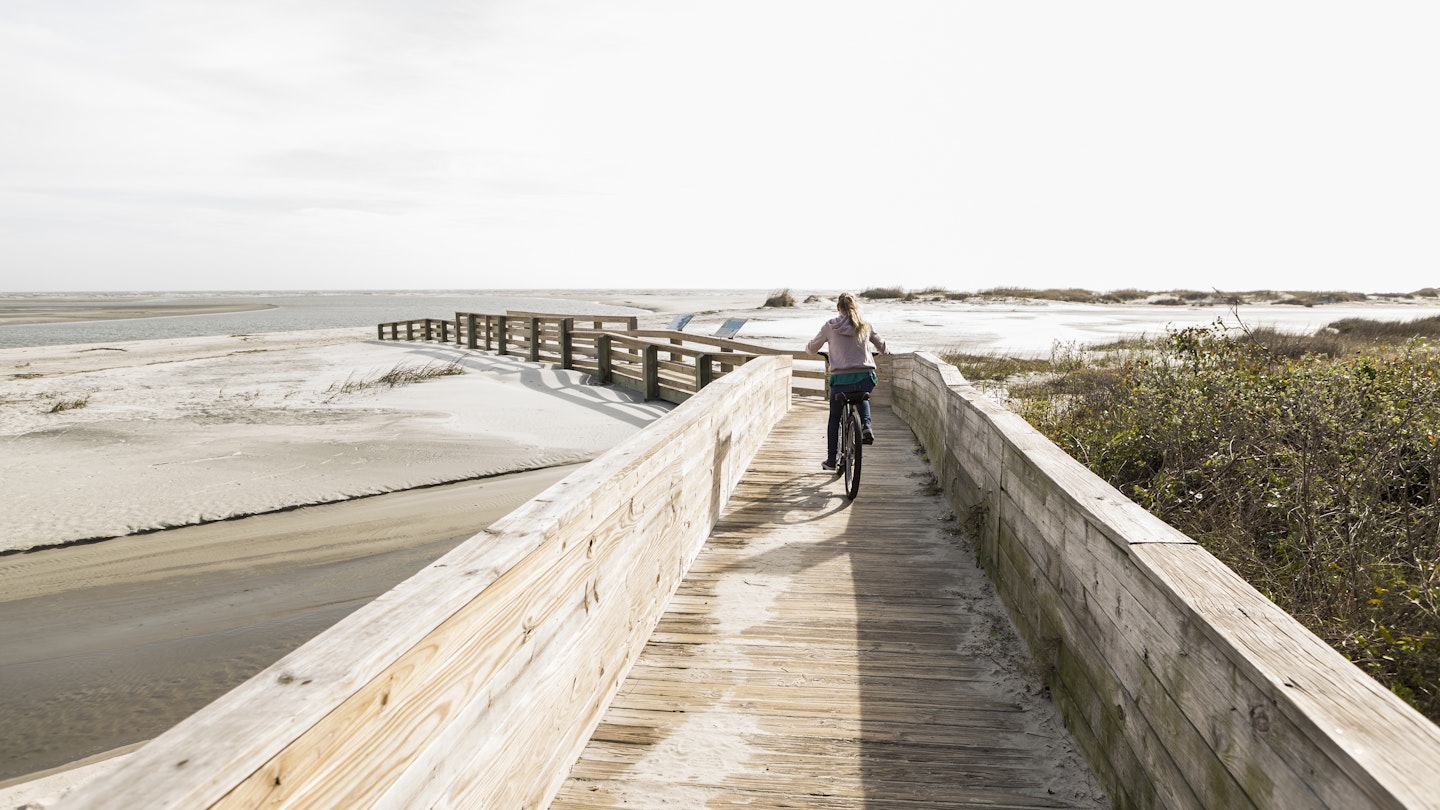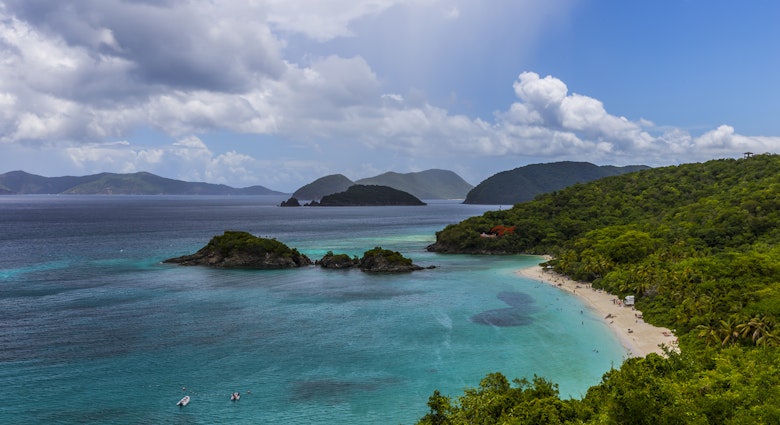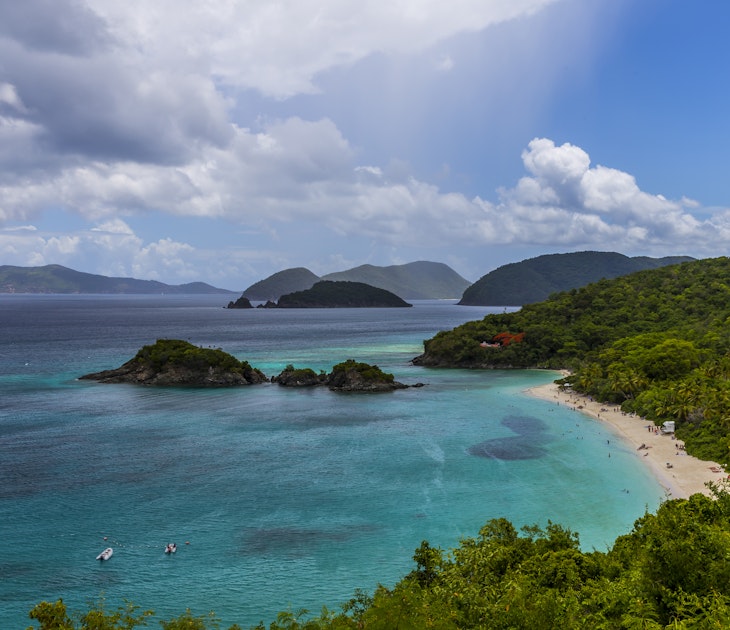
Top 7 beaches in Georgia for families, dog lovers and seashell seekers
Jul 8, 2024 • 4 min read

Georgia's beaches are great for empty sands, scattered seashells and silence © Mint Images / Getty Images
Georgia doesn’t have a lot of coastline, a little more than 100 miles. But that stretch is packed with some of the Atlantic coast's most unique features, and visitors would be hard-pressed to find something like it anywhere else.
This region is dotted with barrier islands, small islands formed by waves that deposit sand in the same area for several millennia. This phenomenon creates a fascinating network of tiny islands and tidal rivers that run beside them, lapping up against the mainland; marshes, lagoons and seaside forests complete the delicate landscape. The Peach State is home to 14 of these islands, each one with its own set of gorgeous beaches.
Some of these beaches are closed to public traffic to protect the wildlife living there – everything from sea turtles to wild boars and horses – but the ones open to the public offer just as much natural diversity. Visitors come to Georgia’s island beaches to walk near-empty white sand beaches, photograph the bones of an old forest, and catch breath-taking sunrises every morning. Here's a list of our favorite stretches of sand – which one will you pick?

1. Driftwood Beach, Jekyll Island
Driftwood Beach may feel a bit eerie upon first glance thanks to the gnarled trunks of live oak trees that punctuate the shore, a result of beach erosion that's caused the forested home of these majestic hardwoods to creep closer to the ocean’s edge. What beach-goers have now is a popular coastal strip that’s a favorite for families, and anyone looking to capture unique photos. Prepare to be joined by several photographers if you plan to shoot the sunrise.
Planning tip: There’s a $10 daily parking fee ($15 for large vehicles) for any vehicle driving onto Jekyll Island. Pedestrians and cyclists are exempt from the fee.
Read more: Get outside at these Georgia state parks

2. North Beach, Tybee Island
North Beach is a haven for those who love to be active on the water, whether you enjoy surfing, sea kayaking and jet skiing – take lessons or hit the waves on your own. Visitors often report seeing dolphins from their vantage point on North Beach, but serious seekers can also book a dolphin tour to get a little closer. Georgia’s oldest and tallest lighthouse is a stone’s throw away – the Tybee Island Lighthouse was originally built in 1773, then partially rebuilt after the top half was destroyed in 1861 during the Civil War.
Planning tip: Tybee Island pays for public services via its parking fee. There’s no free public parking on the island between the hours of 8 am to 8 pm, so plan to shell out about $4/hour no matter where you park, including the spots near North Beach.

3. Stafford Beach, Cumberland Island
If you’ve been longing for a solo day on an empty beach, Cumberland Island will feel like a dream come true. Cumberland Island is a National Seashore, which means it’s protected and preserved by the National Park Service (NPS) and doesn’t allow commercial development or personal vehicles. Only 300 people are allowed on the island each day, most of whom are day-trippers who come to see the Dungeness Ruins. Stafford Beach is a 3.5-mile hike away from the ferry drop, so either bring a bike on the boat with you or prepare for a walk. Determined souls will be rewarded with miles of powdery-white sand and calm waters all to themselves.
Planning Tip: Reservations are required ahead of your visit to Cumberland Island. If you plan to stay overnight, book a room at the island’s only hotel, the Greyfield Inn, or reserve a campsite from the National Park Service (the Stafford Beach campground is closest to Stafford beach). It’s also possible to take a day trip to the island. There’s only one company that offers ferry rides, and it leaves from St. Marys a couple times a day.
Read more: Hit the trail with the best hikes in Georgia
4. St. Andrews Beach, Jekyll Island
Make sure you don’t overlook the river-facing beaches on Georgia’s barrier islands! St. Andrews Beach offers visitors calm waters full of seafoam, and it's a great spot for birding, shelling and dolphin sightings. Just a few feet from the sand is The Wanderer Memory Trail, a short hiking trail parallel to the coast that tells the story of the passengers of The Wanderer, a slave ship that illegally transported more than 400 people to Jekyll Island after the international slave trade was outlawed in the United States.
Planning tip: Double the fun of your beach trip by visiting Driftwood Beach and St. Andrews Beach together. The beaches are about seven miles apart on Jekyll Island and can be reached by car or bicycle.
5. East Beach, St. Simons Island
Warm water and white sand make East Beach on St. Simons a favorite for a majority of Georgia beach enthusiasts. The sand is packed in tight here due to the tides, which makes it ideal for biking along the coastline. St. Simons island’s beaches also get credit for being more pet friendly – unleashed dogs are permitted anytime of year after 6 pm and before 9 am, and they are allowed free reign in the afternoons outside of the busy summer months.
Read more: Pick the best time to visit Georgia for your trip
Explore related stories





 BeachesWhere are the best beaches in the US? Check out these 28 shoreline destinations to explore and enjoy.
BeachesWhere are the best beaches in the US? Check out these 28 shoreline destinations to explore and enjoy.Aug 21, 2024 • 24 min read




